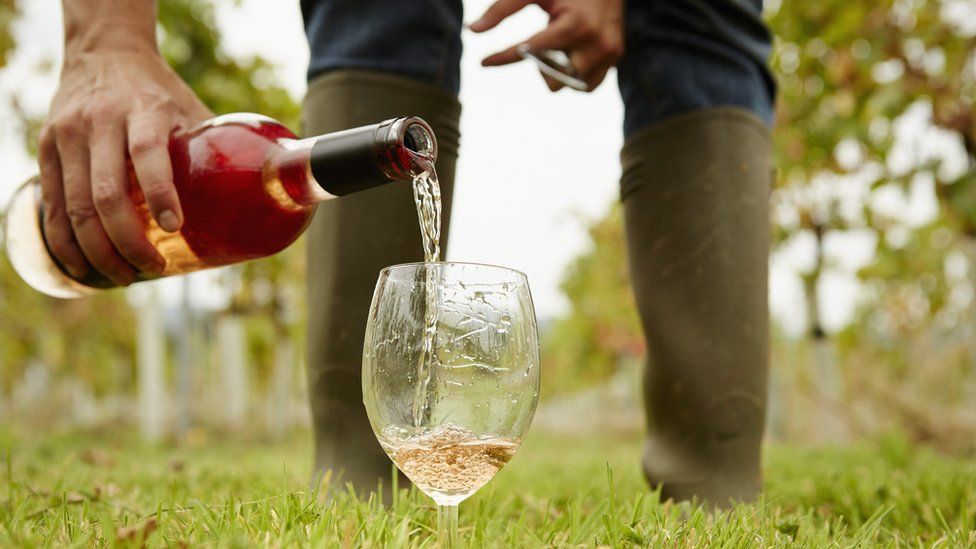ARTICLE AD BOX
 Image source, Getty Images
Image source, Getty Images
By Paul Seddon
Politics reporter
The government plans to change the legal definition of wine following Brexit, to reflect demand for low-alcohol versions of the drink.
Under rules the UK inherited from the EU, wine typically has to contain at least 8.5% alcohol by volume (ABV) to be marketed as such.
It means low and alcohol-free versions have to be sold as a "wine-based drink", or a similar product name.
That ruling will now be scrapped in England next year.
The change is part of a wider package of measures designed to boost British winemaking in the wake of the UK's exit from the EU.
The government says Brexit presents a "unique opportunity" to review "overly complex" EU-era regulations governing the sector.
Legally, wine must be produced by the alcoholic fermentation of grape juice. Alcohol-free and low-alcohol versions are made by removing the alcohol afterwards through a variety of techniques.
However, it order to be labelled as "wine" it currently needs to have a minimum 8.5% ABV, or 4.5% for certain brands of wine that can only be produced in certain regions.
Such naming rules do not apply to low or alcohol-free beer or cider, which are easier and cheaper to produce and have grown in popularity in recent years.
Now, the government has confirmed it intends to lower the minimum ABV to 0% for all types of wine, following a consultation on the plans.
A spokesperson for the environment department told the BBC it would respond to increasing demand for low-alcohol alternatives, and give consumers more choice.
'Natural' language
The change, expected to be made next year following a further consultation, would allow low and no-alcohol wine to be legally described and marketed as "wine" in England.
Wine produced in England would be able to be marketed as such around the UK, under post-Brexit internal market rules.
A policy document announcing the move said it would also allow the production of wines with a "naturally lower" level of alcohol.
Government research published earlier this year found naming alcohol-free versions after the original drink did not generally confuse consumers.
It said that this was often the "most natural way" to refer to such drinks, and descriptions such as "wine-based drink" could be more confusing.
However, some respondents to the study thought it could increase the risk that consumers might buy a non-alcoholic version by accident.
An analysis also found "alcohol free wine" was regularly used in marketing online already, unlike for gin, where similar rules apply but "botanical spirit" was often used for low-alcohol versions.
The EU relaxed its rules on the definition of low-alcohol wine in late 2021 - a change that did not apply in the UK because it copied over EU laws after it officially left in 2020.
Image source, Reuters
Image caption,The requirement for foil wrapping on sparkling wine bottles is also set to be dropped
The Wine and Spirit Trade Association, an industry body, said it wanted to work with the government to agree new labelling rules to ensure consumers are fully informed.
Policy director Simon Stannard said the sector was working hard to produce lower and no-alcohol wines to respond to consumer demand, and the reforms would make current production rules easier to understand.
However, he added that "further description" of low-alcohol wine would be needed to maintain consumer confidence.
"We need to think about the potential for consumers being misled," he added.
Other changes announced by the government include ending the EU ban on the sale of piquette, a low-alcohol French drink made from fermenting crushed grape skins and water, by the end of the year.
It added the move would give vineyards "more options to improve profitability", and respond to a "growing market" for lower-alcohol products.
It also wants to relax EU-derived rules on the shape of bottle that wine can be sold in. Certain types of long-necked thin bottles, for example, can only be used for certain wines.
The mandatory use of mushroom-shaped corks with foil sheaths for sparkling wine will also be dropped, in a move that government said better reflected market trends and would help cut waste.

 1 year ago
20
1 year ago
20








 English (US) ·
English (US) ·